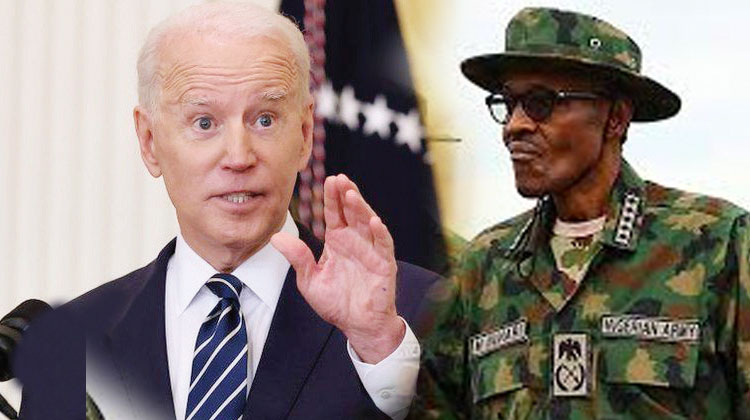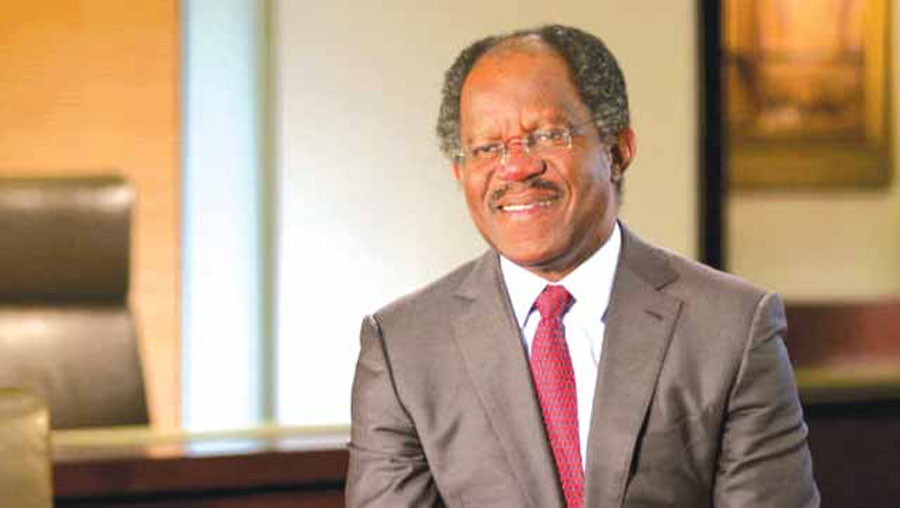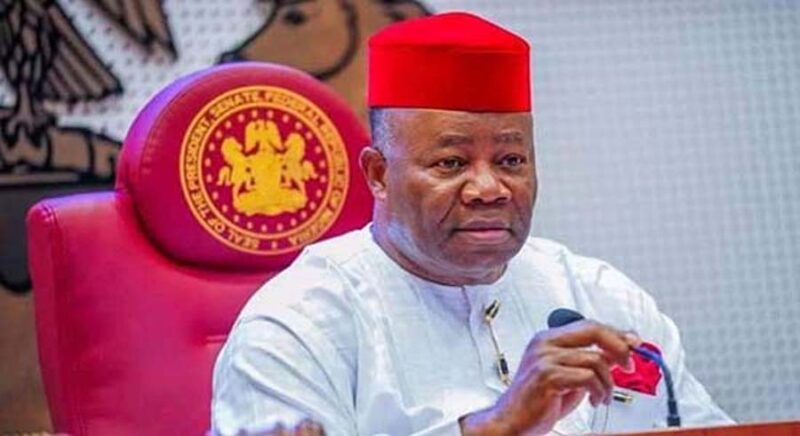The United States has said there is no plan to relocate its Africa Command from its current base in Germany to Nigeria or any other part of Africa despite the worsening state of insecurity in the region.
The US gave the response barely two weeks after the President, Major General Muhammadu Buhari (retd), appealed to the US government to consider relocating AFRICOM to Africa to assist Nigeria and other adjoining countries to combat worsening terrorism, banditry and other security crises.
The President made the plea in a virtual meeting with the US Secretary of State, Antony Blinken, on April 27.
Germany-based Africa Command (AFRICOM) is the US military headquarters that oversees its operations in Africa.
Buhari’s request followed a series of recent military casualties in Nigeria’s decade-long fight against Boko Haram terrorists, fresh expansion of the insurgents’ bases to Niger and Nasarawa states, and heavy wave of abductions and killings by bandits in the North.
Buhari said, “The security challenges in Nigeria remain of great concern to us and impacted more negatively, by existing complex negative pressures in the Sahel, Central and West Africa, as well as the Lake Chad Region.
“Compounded as the situation remains, Nigeria and her security forces remain resolutely committed to containing them and addressing their root causes.
“The support of important and strategic partners like the United States cannot be overstated as the consequences of insecurity will affect all nations, hence the imperative for concerted cooperation and collaboration of all nations to overcome these challenges.
“In this connection, and considering the growing security challenges in West and Central Africa, Gulf of Guinea, Lake Chad region and the Sahel, weighing heavily on Africa, it underscores the need for the United States to consider relocating AFRICOM headquarters from Stuttgart, Germany to Africa and near the Theatre of Operation.”
However, the US government on Thursday ruled out any plan to relocate AFRICOM from its current base in Germany to Nigeria or any part of Africa.
According to the United States Department of Defence’ Pentagon, previous studies have shown that the cost of relocating AFRICOM from Germany to Africa is very huge.
In an emailed response to Saturday PUNCH, the Pentagon said although it would continue to value Nigeria and other countries in Africa as important partners, the American government would not consider relocating AFRICOM to any part of the African continent at the moment.
This newspaper had asked if the US would consider Nigeria’s request to relocate AFRICOM to the continent.
The US Pentagon spokesperson, Ms Cindi King, said, “Although there is an ongoing Global Posture Review, the relocation of Combatant Command headquarters is outside the scope of its assessment. In the case of AFRICOM, previous studies have concluded that the cost associated with the relocation of this headquarters is significant and likely to incur the expense of other engagement opportunities and activities that more directly benefit our valued African partners.
“We greatly value the partnership with Nigeria and appreciate President Buhari’s recognition of the United States’ positive contribution to African peace and security, as well as other regional partners that have made similar past pronouncements. The United States remains committed to continuing our close partnership with African countries and organisations to promote security and stability.”
It’s ‘near impossible’ for America to accept Buhari’s invitation – Campbell, ex-US ambassador
Meanwhile, a former United States Ambassador to Nigeria, John Campbell, has listed reasons why it is “unlikely or near impossible” for the US government to relocate AFRICOM from Stuttgart in Germany to Nigeria or any part of the continent.
He said aside from the fact that the cost of doing so is very huge, the Nigerian military had proved to be a difficult partner for the US over the years.
In an emailed interview with Saturday PUNCH, Campbell, who is the Ralph Bunche Senior Fellow for Africa Policy Studies at the Council on Foreign Relations, a Washington, DC-based think-tank, said, “From an American perspective, moving AFRICOM’s headquarters after 14 years in Stuttgart would be a major undertaking.
“However, should the AFRICOM headquarters move, it is unlikely – if not impossible – that it would be to Africa, with its logistical challenges. Some in the US Congress support moving AFRICOM’s headquarters to the United States as a cost-effective alternative. For example, South Carolina’s senators, both Republican, have advocated moving it to Charleston, the site of large US military installations.
“It is mostly a matter of money. Moving AFRICOM to Africa would require the construction of a sophisticated installation in areas where the basic infrastructure may not yet have been developed. Moving it to the United States would mean making use of already existing but underused installation (e.g., perhaps Charleston) that could be quickly and more cheaply expanded, if necessary.”
The ex-envoy, however, said Buhari’s request marked a reversal of Nigeria’s official opposition to AFRICOM plans to move it to the continent 14 years ago.
“The shift likely reflects the conclusion that the security situation in West Africa and Nigeria is out of control, spurring a willingness to consider options hitherto unacceptable. Buhari argued that AFRICOM’s headquarters should be closer to the theatre of operations. He also seemed to imply greater US involvement in West African security, including a kinetic dimension in the context of greater Western support for West Africa’s response to its security threats.”
He recalled that when President George W Bush established AFRICOM in 2007, a military-civilian hybrid command in support of Africa, African official reaction was largely hostile, seeing the effort as “neo-colonialist.”
Campbell said, “The Nigerian government took the lead in persuading or strong-arming other African states against accepting the AFRICOM headquarters, which was thereupon established at Stuttgart, Germany, already the headquarters of the European Command.
“In addition to opposing AFRICOM in the first place, the Nigerian military authorities have been largely uncooperative with the US military. Hence, the US military involvement in Nigeria, beyond limited training operations, is minimal, and the country does not host any American defence installations.
“Successive Nigerian governments have wanted to purchase sophisticated American military equipment but have rejected US oversight. In fact, Nigerian purchases of US military materials have been rare, despite their high-profile, ultimately successful purchase of 12 A-29 Super Tucanos – sophisticated aircraft.”
Why US can’t relocate AFRICOM troops from Germany to Nigeria –Chatham House fellow
Corroborating Campbell’s view, an Associate Fellow at the United Kingdom-based Chatham House, Matthew Page, said there was no prospect of the US relocating its AFRICOM HQ from Germany to any part of Africa.
Chatham House, also known as the Royal Institute of International Affairs, is an independent policy institute headquarters whose mission is to provide authoritative commentary on world events and offer solutions to global challenges.
Page said, “There is absolutely no prospect of this happening. A combatant command headquarters is an administrative node that requires enormous physical infrastructure and thousands of personnel (and their families) to sustain it. They need to be able to safely live, work, and send their children to school locally. The Nigerian government is unable to safeguard the lives of hard-working Nigerians, never mind a US military installation that would be a juicy target for a terrorist attack.
“With the exception of European Command and Africa Command – which for longstanding historical reasons are located and headquartered in Germany – all combatant commands are located in the United States. These commands do have forward elements and subordinate commands based in the theatre of operations, such as Combined Joint Task Force-Horn of Africa (CJTF-HOA) based in Djibouti. But these typically are task-specific and have a light local footprint. The United States is not – and doesn’t want to be – an imperial power with permanent military outposts on the continent. Nor should African leaders be asking it to become one.”
Page, who was previously with the US Department of State’s Bureau of Intelligence and Research, further said, “I am sure the Biden administration was puzzled by President Buhari’s invitation, given that Nigeria has been a reluctant and difficult security partner for the United States. The Nigerian Army has long viewed US military engagement in West Africa with deep suspicion, shunning deeper ties and ignoring Washington’s calls for security sector reform and human rights improvements. Inviting AFRICOM to relocate to Nigeria is the equivalent of proposing marriage before going on a first date.”
Nigeria, other African leaders must take responsibility for citizens’ security – Expert
However, a counter-terrorism expert and Senior Researcher for the Lake Chad Basin Programme at the Institute for Security Studies, Dakar, Senegal, Dr Akinola Olojo, has said that Buhari and other African leaders must take responsibility for the security of their citizens, noting that the entire burden cannot be pushed on foreign countries.
He spoke against a backdrop of Nigeria and African countries getting US help in the fight against terrorists and other criminals in the region.
Olojo said, “The relocation of the United States Africa Command from Germany to Africa would depend on a number of factors anchored on the foreign policy priorities of the US in the current period. Beyond this, however, is the need for Nigeria (and African countries) to be sincere with a self-interrogation regarding whether the relocation of an external entity such as AFRICOM will address Africa’s challenges of insecurity.
“The ultimate burden of responsibility for ensuring the human security of African citizens lies on the leadership or governments in Africa. The presence of French troops supporting the G5 Sahel Joint Force for nearly a decade has not really solved the fundamental or root causes of the crisis affecting Mali, Niger and Burkina Faso. To be clear, there is nothing wrong with global partnerships when it comes to addressing insecurity. Besides, challenges such as violent extremism have a transnational character and in early 2020, the US and Kenya launched a joint terrorism task force. As long as such frameworks are mutually beneficial, this is good.
“However, the governments of Nigeria and countries in Africa must begin to live up to the responsibility entrusted to them by citizens. In other words, leadership in Africa must inspire and drive the process for implementing the different policy frameworks and national action plans which already exist on the continent.”
Meanwhile, a government official familiar with US operations said even if the US chose to relocate its AFRICOM to Nigeria or any part of the West Coast, it would come with its own challenges which might affect Nigeria or its neighbours adversely.
The official, who spoke on condition of anonymity because he was not authorised to speak on the matter, said, “Bringing AFRICOM to Africa or Nigeria will be a major problem for Nigeria and the African continent. Bringing AFRICOM to Nigeria, for example, will be tantamount to inviting or attracting all the enemies of the US, including global terrorist organisations, to the host country. Such a host country will become a subject of attack from terrorist organisations.”
President Joe Biden had in February stopped the planned withdrawal of US troops from Germany that was ordered last year by the Donald Trump administration but had never actually begun, Associated Press reported.
Biden said the troops’ pullout would be halted until the US Defence Secretary Lloyd Austin did a review of America’s troops presence around the globe.
Austin, he said, would ensure that “our military footprint is appropriately aligned with our foreign policy and national security priorities.”
In a statement, Austin said the US Department of Defence would conduct “a global force posture review of U.S. military footprint, resources, strategy and missions.”
The review, he said, “will inform my advice to the commander in chief about how we best allocate military forces in pursuit of national interests. The review will be led by the acting undersecretary of defence for policy, in close consultation with the chairman of the Joint Chiefs of Staff.”
Last year, President Trump announced that he was going to pull out about 9,500 of the roughly 34,500 US troops stationed in Germany. The US has several major military facilities in the country, including Ramstein Air Base, the headquarters for US European Command and US Africa Command, and Landstuhl Regional Medical Centre, the largest American hospital outside the United States.
Trump’s order met resistance from Congress as well as from within the military, which has long relied on Germany as a key ally and base of operations. Trump announced the troop cuts after repeatedly accusing Germany of not paying enough for its own defence, calling the long time NATO ally “delinquent” for failing to spend two per cent of its GDP on defence, the alliance benchmark.
Austin hinted at a likely reconsideration of the order in a conversation with his German counterpart.
German officials believe the order will be rescinded by the new administration, and the German Defence Ministry said that in Austin’s call with his German counterpart, he “emphasised that Germany is highly valued as a station and that American soldiers feel very comfortable here.”
“The US continues to consider its presence in Germany as an important part of joint security,” the Defense Ministry said.
-Saturday Punch





















